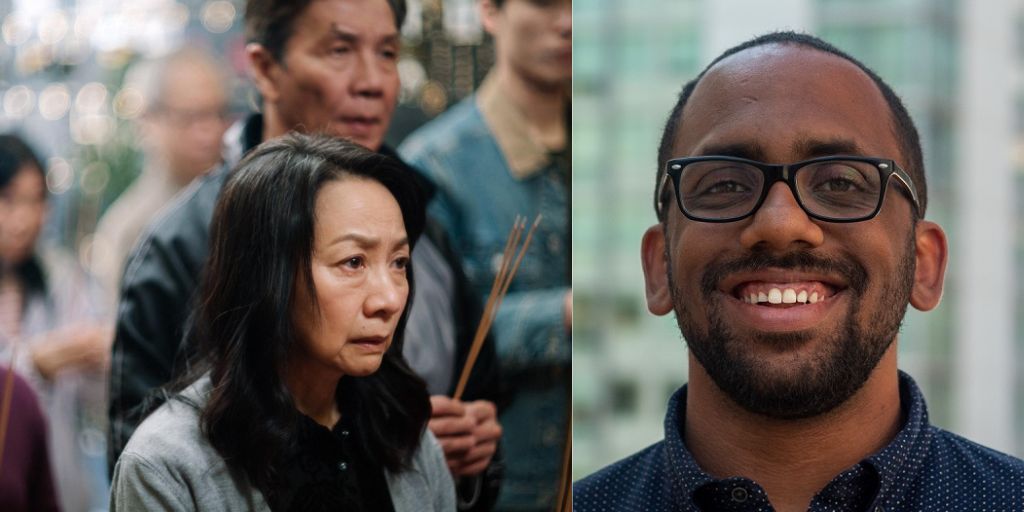All Shall Be Well focuses on the seemingly ordinary moments in life, such as making breakfast, going to a flower shop, and decorating a house for a holiday. Although these actions may seem uneventful, director Ray Yeung presents them in a way that makes them feel vital and full of meaning. The film brings depth and humanity to characters who usually do not receive such attention.
What is ‘All Shall Be Well’ About?
The film follows a lesbian couple in their mid-60s, Pat (Maggie Li Lin Lin) and Angie (Patra Au), who live in Hong Kong. Pat is a successful and charming businesswoman, while Angie, more reserved, opens up when they are alone.
Together, they have enough savings from their textile factory to help their friends, such as flower shop owners Kathy (Suen Wai Fong) and Betty (Priscilla Leung Siu Wai), and their struggling nephew Victor (Chung-Hang Leung) and his girlfriend Kitty (Yung Ting Rachel Leung). Pat and Angie seem to be in a fortunate position in their family.
However, things take a tragic turn when Pat unexpectedly dies in her sleep. Angie not only has to face her grief but also deal with the fact that Pat never made a will. They were never able to get married since same-sex marriage is not legal in Hong Kong or China.
This means all of Pat’s assets go to her brother Shing (Tai Bo), his wife Mei (Hui So Ying), and their children Victor and Fanny (Fish Liew).
Each of them is facing financial difficulties, and Angie, who thought she could trust them, soon realizes they are gradually betraying her for their own benefit. This forces Angie to stand up for herself and find her voice.
‘All Shall Be Well’ Features a Groundbreaking Central Couple
It is rare to see characters like Pat and Angie as the main focus of a film. Female leads are already less common, and if they are queer and over 60, it becomes even more unusual. Seeing them not only featured but portrayed with complexity and authenticity is refreshing, making their story relatable to many viewers.
Maggie Li Lin Lin brings a magnetic presence to the role of Pat. She is the type of person people are naturally drawn to, with a lively energy that can fill a room.

At the same time, Pat is also a caring host, making everyone feel important. Ray Yeung does not idealize her, however, showing her flaws, such as her reluctance to write a will due to the emotions involved. This makes her character more realistic.
Patra Au’s portrayal of Angie is equally strong. The film mainly revolves around Angie, and Au brings out her quiet strength. Watching her lose Pat, her long-term partner, is heartbreaking. Angie is unsure how to show life without Pat, who was always the bold one in their relationship.
For example, when Shing tells Angie about his new job, which takes advantage of him, it is clear that Pat would have been the one to handle it. Now, Angie has to step into that role. Yeung’s decision to make Angie confront her own tendency to be passive while dealing with grief is a brilliant choice.
Angie’s love for Pat’s family, who had accepted her, contrasts with her own parents, who only ever saw Pat as a “friend.” The gradual loss of her connection with Pat’s family after her death adds another layer of sorrow to Angie’s journey. Au excels in the scenes where Angie asserts herself, providing a subtle but satisfying emotional release.
Though the film is mainly about loss and Angie’s path to healing, Yeung spends ample time building their relationship, making the audience care deeply about the couple. Despite the film’s short runtime of just over 90 minutes, their bond feels real, with a natural humor that emerges in their interactions.
For instance, Pat jokes about still dealing with childhood trauma or when Angie jokes after hearing Fanny say she is disgusted by her husband, responding that she would “be sick too” if a man touched her. These moments of humor between them feel genuine and based on a deep trust, making the film feel more real.
‘All Shall Be Well’ is a Simple Yet Emotional Film
The supporting characters in All Shall Be Well are given the same care as Pat and Angie, avoiding simple villain roles.
It is easy to understand their financial struggles and believe they are acting in what they believe to be the best interest when making decisions about Pat’s funeral arrangements, even if they go against her wishes. Their actions, though selfish, feel believable, and it is clear that they genuinely think they are doing the right thing.
Victor and Fanny, though sympathetic to Angie, struggle to confront their parents and eventually become part of the problem.
Their silent judgment slowly turns into complicity as they start to take advantage of Angie without fully realizing it. This slow betrayal is deeply painful to watch as Angie loses more than just Pat—she also loses her connection to Pat’s family.
While the plot is straightforward, it sometimes feels a bit thin. The story could benefit from a few more unexpected moments to add a sense of urgency. Additionally, the film’s minimal use of music could be seen as a missed opportunity to enhance certain scenes.
However, the film’s attention to detail, especially for viewers unfamiliar with aspects of Chinese culture, keeps it engaging.
For instance, the debate over whether Pat should be buried at sea or in a columbarium is thought-provoking. Yeung also does a wonderful job of representing the couple’s large group of queer friends, a realistic depiction of the LGBTQ+ community’s support network.

All Shall Be Well is a thoughtful story filled with carefully considered details. It raises important questions about gay rights, honoring loved ones after death, and how easily selfishness can take over when making difficult decisions.
Yeung’s film beautifully captures both the joy and sadness of life, offering a perspective that is rarely seen in cinema. It’s a pity that queer stories like this are so rare in Hong Kong, with Wong Kar-wai’s Happy Together being one of the few notable examples. Hopefully, this film will spark more discussions about queer representation and lead to more stories like this in the future.




